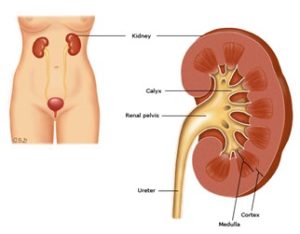Renal history taking
We will now describe renal history taking. As with all medical history taking ..
Listen to your patient, he is telling you the diagnosis”. Dr William Osler (1849-1919)
.. and 90% of the diagnosis is in the medical history. Full stop.

It is important to ask questions about all of the urinary tract, including the prostate in a man. These questions can be used in a clinical or examination setting.
Pre-introduction observation (before questions)
Before you start, stop, slow down and think. Just for 15 seconds.
Right. Antennae up. Observe the patient and environs around the patient. Why?
Observation is 90% of medicine”
What can you see? What’s their biological age? Walking pace? How are they dressed (and why)? What are they reading (and why)? Are they in pain (from where)? What’s their mood? Are they short of breath or have ankle swelling (fluid overloaded?) Dizzy and maybe falling (low BP? dry?)
Wash hands. Now you can ask questions. Clock on. Here we go ..
How to take a renal medical history
These are ten questions you can ask, and the words to use. They can be asked in ten minutes.
1. Introduction – Start with a handshake. “Hello, my name is XX and I’m a student doctor YY. You are Mr/Mrs ZZ and you are AA years old. Is that correct?”
You can ask date of birth but that takes longer and you have to do mental arithmetic to calculate the age. The handshake is also a diagnostic tool.
2. PC – “What is the current problem?” Listen very (very) carefully. The diagnosis is often in the patient’s first few words. Write it down. Come back to that at the end.
3. HPC – “Please tell me more about the problem”. Ditto.
There may be no presenting symptoms if the patient has been referred for investigation of mild or moderate CKD (creatinine up to 200 mcmol/L).
If there are symptoms they are often non-specific, with other (non-renal) causes, e.g. shortness of breath, ankle swelling or itching. Occasionally they are more ‘renal’ such as frothy urine; or more ‘urological’ such as difficulty passing urine. Renal pain is rare.
To save time, ask relevant questions from systems review here (30 sec). These include questions about urination, polyuria or oliguria, macro-haematuria, and prostatism in a man. You will not have time to do a full systems review.
4. PSH – “What major operations have you had?” You are especially interested in kidney (including a kidney transplant, or fistula) or bladder surgery, renal stones, and prostate surgery (in a man). But a CABG, AAA or vascular surgical operation may be relevant too, as it can suggest renovascular disease is some or all of the diagnosis.
5. PMH – “Have you ever had .. diabetes (important in renal disease), jaundice, anaemia, tuberculosis, heart attacks, strokes, high blood pressure (also important), epilepsy, rheumatic fever, or ulcers in your tummy?”
Ask a specific renal question at this point: “are you known to have CKD or have had dialysis, or any other previous problems with your kidneys or bladder (or prostate, in a man)?”
You need to have finished PMH by 5 mins
6. Drugs/Allergies – “Please show me a list of your current medication? And have you had a major allergic reaction to any medication?”
The medication history is the most important part of a renal history You need to take it carefully.
All drugs can affect the kidney. But the most renally important drugs are: ACE/ARB, SGLT2is, diuretics, NSAIDs, recent chemotherapy, lithium and spironolactone. They can cause or worsen CKD and/or hyperkalaemia, and may need to be stopped.
7. SH – “Are you married, how many children have you had, and what is/was your current/last job?”
Occupation is not usually relevant for renal disease. But you should still ask about their current or last job.
8. SH – “Have you ever smoked, and have you ever been a regular heavy drinker?”
Smoking is the primary risk factor (with age) for renovascular disease.
9. FH – (depending on age of patient) “Are your parents alive fit and well? OR “Are your parents still with us?” Depending on answer, “what did they die of?” OR “What did your parents die of?” AND “Are there any diseases that run in the family?”
“Has anyone in your family ever had kidney dialysis, kidney failure or a kidney transplant?” (you are looking for PCKD primarily)
“Has anyone in your family had any funny or rare diseases?” (autoimmune disease)
You need to have finished SH/FH by 8 mins, to give time for ..
10. ICE – “What are your ideas about what’s going on, and what are your concerns and expectations (of us)?” (2 min). This also gives time for you to think what have you forgotten .. did you ask about medication/allergies and/or smoking/alcohol?
At this point, the patient may give you crucial information like they are on dialysis, or have a transplant, and the underlying cause of CKD/ESRF etc.
Summary
We have described renal history-taking. The drug history is especially important. We hope you have found it useful. Like all history taking, the only way to get good at it, is to practice alot (alot).
Other resource
Last Reviewed on 2 July 2024
